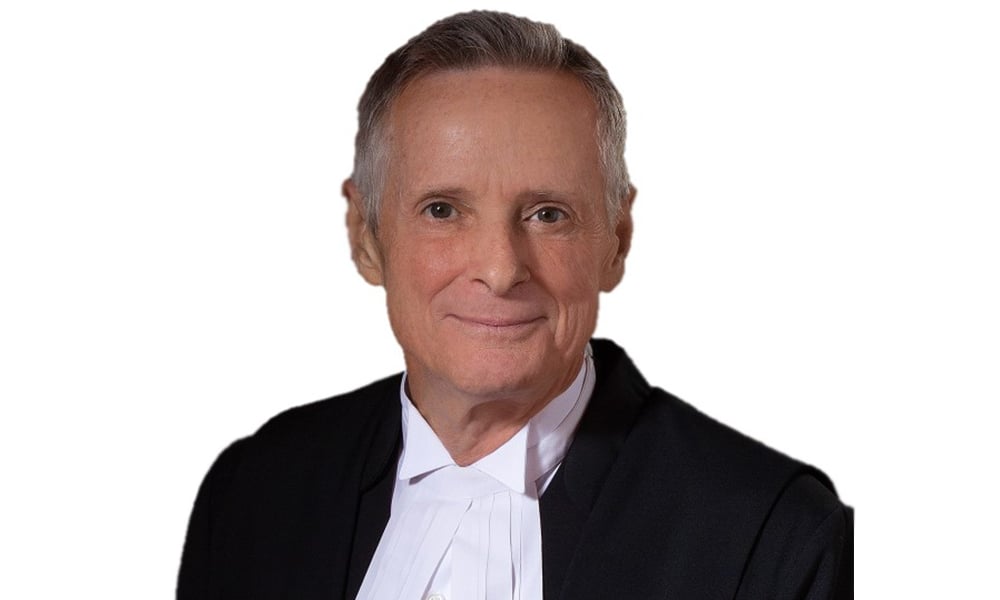
FCA Chief Justice Marc Noël discusses how his court has adapted in the wake of COVID-19

As courts across the country have struggled to continue operating in light of COVID-19 and the physical distancing required, Canadian Lawyer has surveyed chief justices of courts across Canada on how they are managing the crisis. Here, Chief Justice of the Federal Court of Appeal Marc Noël answers Canadian Lawyer’s questions about COVID-19’s impact on his own court.
What are some of the adjustments you’ve had to make since COVID-19 was declared a pandemic?
It was a long adjustment; initially we relied on the rule that allows us to control our proceedings, and we suspended all delays running under the federal court rules and under the directions and outstanding orders of the court in order to allow for the parties and the registry an adjustment period. We lived with that from March 19 onwards. On April 16, we realized that this might last a little longer than was hoped for. And so we reverted to the practice of virtual hearings.
We assign these files to be heard virtually, either by telephone or by video conference, [largely] using Zoom. And we allowed for certain proceedings to be determined on consent in writing, and also at the direction of the court in writing. That option is one that we use a lot in the Federal Courts of Appeal on a regular basis, because we are a traveling court. We sit across the country, which poses additional challenges in terms of when this will end for us. We not only have to look at one location, but at provinces and territories and the conditions that prevail in those respective areas.
But [as a] traveling court, we use written disposition of motions extensively. So our clients are used to seeing us deal with many, many issues in writing. So [virtual hearings] was well received and not a problem. We also use telephone conferences quite a bit on motions, so that’s not unusual.
Our first appeal by videoconference was heard this morning. We’re going to be hearing about 25 appeals between now and the beginning of June [with] additional cases in line for the period of June until July.
Another adaption is temporarily allowing for e-filing via email. With limited on-site staff, it allows parties to file motions and materials electronically.
What is your greatest concern right now?
My greatest concern is the safety and health of our clients and our registry officers, and the people who make the court work. You want to make sure they’re there at end of this exercise, of this crisis. But we are trying to balance as best we can these two considerations: the health of the people who appear before us, and who work within the court, and at the same time allowing the court to do its work to the extent that it can. Balancing these two competing concerns is the challenge.
What are your courts considering “urgent” matters that must proceed now?
Appeals under the Patented Medicine Prices Review legislation have to be completed in a two-year period, and sometimes we’re running short of that period of time. Those are urgent matters by statute. Appeals of deportation orders, to a country where a person alleges they’ll be in peril, are also urgent. You have urgent matters in the patent areas, where people basically lose their rights. So there's a variety of cases that we consider to be urgent, and during the COVID period parties who claim to have an urgent matter are invited to apply and, if indeed the matter is urgent, to proceed forthwith.
What have your experiences been in operating a virtual courtroom?
We heard the first appeal this morning by videoconference; it was the first case in memory where everyone was joining in by videoconference [and] participating remotely. It went well; counsel are very conscious of the fact that this is novel, so they’re very organized and precise in their representation [and] used their time well. It certainly is a satisfactory way of hearing appeals.
[Going forward], we have many jurisdictions which are concurrent jurisdictions, and so we have to be mindful of the fact that if we become the court people think they appear before through videoconferencing, in circumstances where they have the ability to go to the superior courts and appear in person, we would lose credibility and clientele. So we have to be very mindful of the fact that we have to be present across the country as a traveling court, but nevertheless, the experience is teaching us that it can be done.
There is a danger that this period of difficulty will last, and what concerns me a lot is, I don’t want to see my court be immobilized. I’m happy to see that notwithstanding the challenges, we’re able to operate, if not normally, in a way that will allow us to do the job we have to do.
When this all started, I wasn’t sure we’d be able to pick up the ball again … but it looks as if we’re able to do that, and that’s very encouraging.